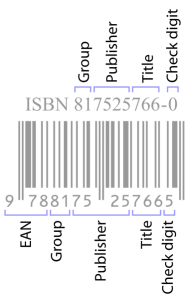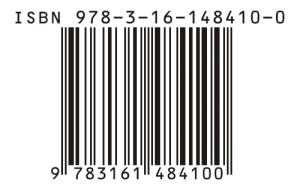by Kirby Anderson
Is an ISBN required for your book?
ISBN is a communication tool used by the publishing industry to differentiate and catalog books. Until recently, most authors didn’t worry about it; their publisher took care of it. But if you’re self-published, it’s your job to buy an ISBN for your book … if you need it.
QUICK INFO
- ISBN = International Standard Book Number
- it’s a 13 digit number (It used to be 10.)
- it’s printed on the copyright page
- The ISBN identifies the title and edition of a book and the publisher to be contacted for ordering the book
- each edition or format of a book gets its own ISBN
- Who buys the ISBN? The publisher.
If you’re self-publishing an ebook, you may not need an ISBN. For example, if you sell your ebook online via Amazon’s Kindle Direct Publishing and/or Barnes & Noble’s NOOK Press, they don’t require it. Apple’s iBookstore used to require it, but no longer. And you can sell your book on your own website without an ISBN. (Check with an accountant first for sales tax implications.) It varies from outlet to outlet. So, before making the decision to purchase an ISBN, check to see what each etailer requires. Note that different file formats (e.g. epub, PDF) qualify for separate ISBNs.
If you self-publish and plan to make a print version of your book available in bookstores, an ISBN is necessary. Bookstores track books solely by their ISBNs. But, if you’re selling your print book on your own and are not trying to place it in stores or libraries or with wholesalers, it’s not required. An ISBN for your print book will be a separate number from an ISBN for your ebook (if you have one for your ebook).
Purchasing ISBNs
You may buy ISBNs one at a time or in quantity. In the U.S., one ISBN costs $125. Larger orders get a discount, so if you’re certain you’ll be self-publishing at least two books (or two formats of the same book), then you may want to purchase ten ISBNs for $250 and use the rest later. (Sorry, once assigned, ISBNs are non-transferable.)
Each country has one agency that sells ISBNs. Although you buy it in your home country, it works all over the world–you don’t need a separate number to distribute your book in Belgium. In the U.S., it’s the Bowker U.S. ISBN Agency.
 IMPORTANT: If you are a self-publishing U.S. author, and you want an ISBN, it’s recommended you use only Bowker. If you purchase an ISBN from a company other than Bowker, then: 1) they originally bought the number from Bowker; and 2) the company you rebought the ISBN from may legally be considered the publisher of your book. This includes businesses that proof/format/print/distribute/etc. your book for a fee and include an ISBN as part of a package. That may not be a problem for you, but many self–published authors have expressed the preference that royalty information and payments come directly to them instead of through a third party.
IMPORTANT: If you are a self-publishing U.S. author, and you want an ISBN, it’s recommended you use only Bowker. If you purchase an ISBN from a company other than Bowker, then: 1) they originally bought the number from Bowker; and 2) the company you rebought the ISBN from may legally be considered the publisher of your book. This includes businesses that proof/format/print/distribute/etc. your book for a fee and include an ISBN as part of a package. That may not be a problem for you, but many self–published authors have expressed the preference that royalty information and payments come directly to them instead of through a third party.
U.S. publishers and self-publishers purchase their ISBNs online from Bowker at https://www.myidentifiers.com/Get-your-isbn-now. Try to ignore that their home page looks like a pet store; the website is actually very informative. Also, for indie authors, check out Bowker’s latest info website http://selfpublishedauthor.com.
Canadians, contact The Canadian ISBN Service Center. Your ISBN is free.
British citizens should contact Nielsen UK ISBN Agency or you can purchase one or more ISBNs (and barcodes, if you like) directly from the Nielsen ISBN Store. The cost for ten numbers is £164.00 pounds (includes VAT).
Here’s a list of things that can have ISBNs:
- books – each format of a book would get a separate number (print, audio, each digital format)
- reprints do not need a new ISBN, but new editions do
- coloring books
- graphic novels
- maps
- puzzle books (crossword, Sudoku)
Here’s a list of things that typically DO NOT have ISBNs:
- free books
- magazines and periodicals
- comic books
- compact disks (music)
- DVD’s (entertainment)
- video games
- board games
Barcodes
Bowker U.S. ISBN Agency also sells barcodes. If you self-publish and plan to sell print versions, you may want a barcode on the cover as few book merchants actually read the ISBN numbers anymore, they scan them. You can turn a number into a barcode for $25.
Tux.org has a page where you can generate an ISBN barcode for free. (You have to have an ISBN first.) They recommend you do a trial scan on your barcode before going to press. It’s free, so no guarantees.
The barcode is placed on the lower half of the back cover. For paperback books, it goes on the back cover AND on the lower half of the inside front cover. Take a look at the covers of the print books you own for better guidance. Be sure your cover artist understands the bar code position requirements as they design.
The International ISBN Agency is a good resource for additional information.
